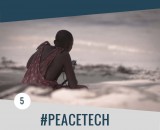Maheswara Thrives in Building Peace from Below

Born to a farming family in a village in the Sankhuwasabha district of Nepal, Maheswara Shrestha Bajracharya spent her childhood herding cattle, ploughing, caring for siblings, and cooking for her family. In a society with strong gender discrimination, Maheswara’s parents restricted her from going to school. But she was interested in education, and attracted to the sports that her peers in the community enjoyed, so despite her parents’ objections, she secretly entered the first grade at the age of 11.
“I was beaten up badly when my parents found out that I got admitted to the school,” Maheswara recalls. She protested and continued to go to school, but as an exchange, she had to take cattle along for grazing and tie them up outside the school compound until classes finished. In addition, she faced constant assaults, both verbal and physical, and received plenty of household chores to complete. Yet her perseverance and zeal for education compelled her every day to school. Her passion for sports was unusual—especially rare among the girls in her remote district of Nepal.
Maheswara was 17 when she got married, under family pressure, and had her first child the following year. Her husband expelled her for giving birth to a girl, and she went back to her parents’ house seeking security and support. Her parents did not receive her well, and her brothers accused her of leaving her husband’s house because she was eyeing her parents’ property. In Maheswara’s words, “One day I went to a river side attempting suicide. I thought of my child for a while and gave up the idea of suicide and made my commitment to give a better life to my daughter.” She vowed to complete her education and rejoined the school in the ninth grade, paying the necessary fees by selling her earrings.
After she completed high school, Maheswara found a job with British Nepal Medical Trust (BNMT) as an aide. Alongside other girls her age, she felt comparatively wealthy. Her income now made her husband want to reconnect with her. She went back to him for the sake of giving the father’s name to her child. She had a second child. Then her husband died in an accident, leaving her with yet another stigma as a single woman. The Maoist conflict was heightening during the time, leaving other women widowed as 200 people were killed or disappeared in the district. Maheswara approached various organizations for support, knocking on the doors of NGO and government offices, but was only humiliated and intimidated. Meanwhile, she lost her job with the BNMT.
A gradual strengthening of the institutional arrangements to address issues of conflict victims opened doors for Maheswara and other women in similar situations. Women in Human Rights (WHR), an umbrella organization for single women, heard about Maheswara and called her to join the organization as a focal person in the district to support the cause of preventing discrimination against women on the basis of marital status. Maheswara formed a seven-member district committee of single women and got it registered in WHR. Together with WHR and Rural Reconstruction Nepal, she secured resources from the local government district development committee and mobilized them in community activities for building peace. She has now shifted to advocacy for women’s rights and gender equality, lobbying for women representation in peace negotiations, mobilizing women for social and economic reforms, and attending meetings and seminars on related issues. As a strong believer in using sports as a method for peacebuilding, she continues to be involved in athletics. Sharing her sports certificates and medals with the national government gave her the opportunity to serve as a district instructor and she is pleased to constructively engage with the youth. Now a sports coach and mother of two children with household and NGO responsibilities, she is a unique member of the community.
“I am pleased with what I have now,” says Maheswara. “I am helping two of my daughters go to college. I am no longer afraid of speaking about and presenting issues before the authorities. I am welcomed in my community meetings and trusted for managing resources. I hope to raise the status of all women in my village to the same height.”

